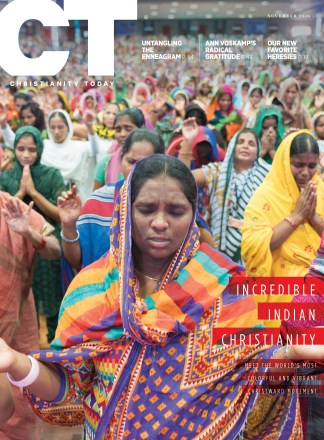An Anglican man rang me out of the blue the other day to ask if the New Testament teaches “equality.” “Not really,” I replied. “The New Testament mentions equality once or twice, but when it comes to social relationships, it is far more interested in concepts like oneness, commonness, partnership, union, and joint-inheritance. If you make all those passages about equality, you flatten their meaning. And in any case, it’s become a blunderbuss word that means everything and nothing.”
Considering the history of the past 50 years, let alone the last 2,000, it might seem unwise to dismiss “equality” so casually. Thankfully, the New Testament presents a better, higher vision.
Two New Testament texts explicitly mention isotēs, the Greek word for equality, proportionality, or fairness. In 2 Corinthians 8:13–14, Paul urges the church in Corinth to give generously to the Jerusalem church, “that there might be equality.” And in Colossians 4:1, he tells masters to grant their slaves “what is right and fair.”
Most of the famous “equality” passages use quite different language. Galatians 3:28 doesn’t say that there is no Jew and Gentile, slave and free, male and female because we are all equal, but because we “are all one in Christ Jesus.” Colossians 3:11 doesn’t talk about equality between barbarians and Scythians, but rather asserts that “Christ is all, and is in all.” Ephesians 3:6 doesn’t say that Gentiles are now equal with Jews, but rather that we are now “heirs together.” Ephesians 6:9 doesn’t talk about equality between slaves and masters, but rather that both have the same Master and will face the same judgment. Finally, 1 Corinthians 12 doesn’t say that all church members are equal, but rather that we all form one body.
Equality, in the modern sense, is fundamentally individualistic.
Of course, the idea of equality is perfectly biblical, and vital: All human beings, simply by virtue of being human beings, should be treated with the same level of dignity, regardless of class, sex, race, or subgroup. Christians today use “equality” to mean roughly what Martin Luther King Jr. meant: Because “all men are created equal,” we need to fight the injustices that cause oppression and discrimination. But in substituting the Declaration of Independence’s language of “equality” for the biblical language of oneness, fairness, justice, partnership, joint-inheritance, and so on, we distort the realities to which it points.
The most important thing we lose is the biblical storyline, in which (most obviously) Jews and Gentiles are not “equal”; the former are chosen for the sake of blessing the latter. If Ephesians 2:14 is about Christ making the two “equal,” rather than making the two “one,” several problems arise. Such a statement flattens the differences between us in the present; it implies that God’s election of Israel was somehow unjust; it suggests that Paul’s basic point concerned equal access to entitlements and privileges rather than incorporation into one people; and it gives the impression of a leveling (Jews come down and Gentiles come up) rather than an increase (Gentiles join God’s people, receiving the same blessings God promised Abraham). Equality, in the modern sense, is fundamentally individualistic: I am equal with you, and you’re equal with me, no matter whether we’re joined in any way. There’s no room for concepts like oneness, unity, and partnership.
Equality-talk also introduces confusion. Unwittingly or not, it encourages an ideal of sameness that makes diversity harder to sustain. (“If the whole body were an eye, where would the sense of hearing be?”) It leads to all sorts of non sequiturs, from the drive toward “marriage equality” to the phrases we invent to avoid labeling people as “special needs.” It adds anachronistic baggage. Paul was not pitching a modern program of equal opportunity. He was announcing the good news that God had united all types of people in Christ, and that none could therefore regard themselves as superior or inferior, despite all the differences that remained.
For all the good the Declaration of Independence has wrought, it’s misleading to claim that the New Testament shares its vision of equality. Scripture is after something far loftier than “all men are created equal”: oneness, partnership, communion, unity-in-diversity, joint-inheritance—and love across each and every dividing line.
Andrew Wilson is teaching pastor at King’s Church London and author of The Life We Never Expected (Crossway). Follow him on Twitter @AJWTheology.










